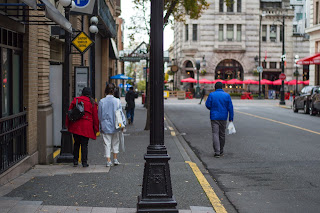Where did all the residential rentals go?
I am currently a renter.
I am also currently a home owner - waiting for our old home to be cleared to make way for a new home that will better meet our family's needs for the decades to come, and potentially adding a suite to the housing market.
However, when I think about the prospect of being a landlord, the prospect is not overly alluring. Given current laws governing the landlord tenant relationship - a measure of hesitancy is understandable.
Let's begin with the math on the new suite. We estimate that the cost of our build is about $400 per square foot, and the two bedroom suite is about 700 square feet. That's $280,000 - without accounting for any share of the land value the suite uses. As the suite is about 15 percent of the total square footage of the home, the proportionate share of land value is another $171,000. So the suite has a value of $450,000 - given this what is a fair rental rate? At $2,000 per month - it would be 18.75 years before the rent covers the value of the suite. Never mind any of the ongoing expenses of property taxes, or interest expenses of the mortgage. Further, if the unit is in the residential market, rents can only increase by the prescribed amount (which in BC is 1.5% for 2022, at a time when inflation is at 20 year highs). Now consider that the damage deposit on the suite is $1,000, or $2,000 if the potential tenant has a pet. If there are issues, let's say the tenant smokes in the suite despite there being an explicit no-smoking term in the tenancy agreement, what happens?
A 30 day notice to end tenancy for breach of a material term of the lease could be served. For non-payment of rent, a 10 day notice to end tenancy can be served.
If the tenant agrees with the notice, they move, and another tenant is found to take their place. However what happens if they don't agree? They dispute the notice to the residential tenancy branch - and after a hearing (which can take months to occur), if RTB agrees an order of possession could be issued. If the RTB disagrees, the tenant remains. What happens if you're given an order of possession, but the tenant doesn't move? You then have to enforce the order of possession.
How much time and effort will be needed to remedy the situation and will the damage deposit cover the damages (note, if a lawyer is needed to provide assistance, the legal fees currently run more than $250/hour)? If a bailiff is needed, then who covers the expense of the move and the post-move cleanup? If items are left behind - it is the landlord's expense to store them for a period of 90 days.
So the risk of a problem tenant is very real, with expenses that may fall far short of the damage deposit given.
Alternatively, the owner of a suite could decide that short term rentals are a better bet. Rather than a damage deposit, potential damages are covered by insurance, and the nightly rate is likely to be $200 or more ($5600 per month). More reward, less risk. A middle ground might be to only consider tenancies from medium term tenants. People who are looking for a temporary home, perhaps while they renovate their own home, visit Victoria over the Winter, or are temporarily relocated for work.
It is clear as to why the lower cost, month to month, residential tenancy market is being starved of supply, leading to a situation where, even those with solid, middle class incomes and jobs, are started to look towards public housing. The failure of the private market to adequately provide reasonable supply is leading to demands that the public fill the void - and invariably increase the tax burden that we all carry.
So how can the private market be remedied? What needs to shift to improve the residential housing market so that there is adequate, affordable residential rental supply. There are many who have developed secondary suites - the soft density that was promised to help our housing dilemmas - who do not supply their suites to the rental market because of risk, how do we unlock that supply?
A few ideas:
1. Provide tax credits/deductions to those who supply appropriate, affordable, residential rentals for the difference between the rental rate given and prevailing market rate.
2. Treat partially owner occupied rentals differently from properties where the owner is residing elsewhere, generally speaking these units are far more sensitive to risk than properties held for purely investment purposes. Consider adopting notice provisions that have some relationship to tenure length and allow for no-fault termination of tenancy.
3. Get rid of the damage deposit system and replace it with an insurance system where landlords and tenants pay insurance premiums based on risk and information on risk ratings is available to prospective landlords and tenants. (Similar to how both guests and hosts can be rated on AirBnB).
4. License residential rental and transient accommodation units to improve information on the market.

Comments
Post a Comment